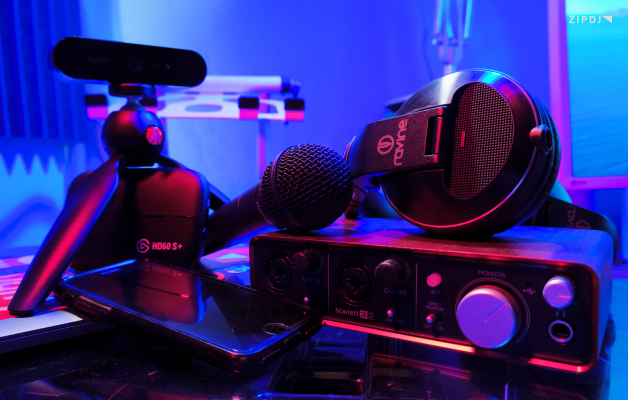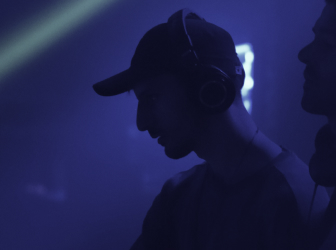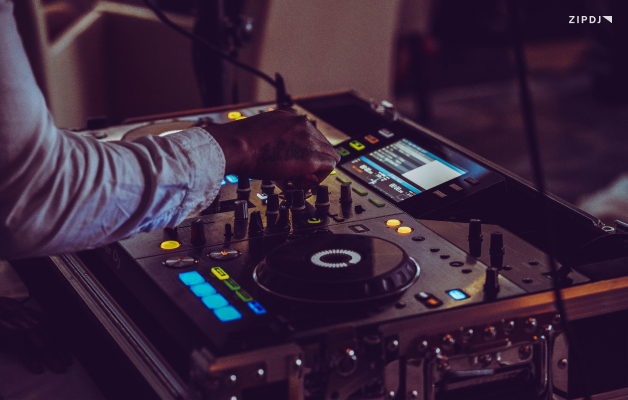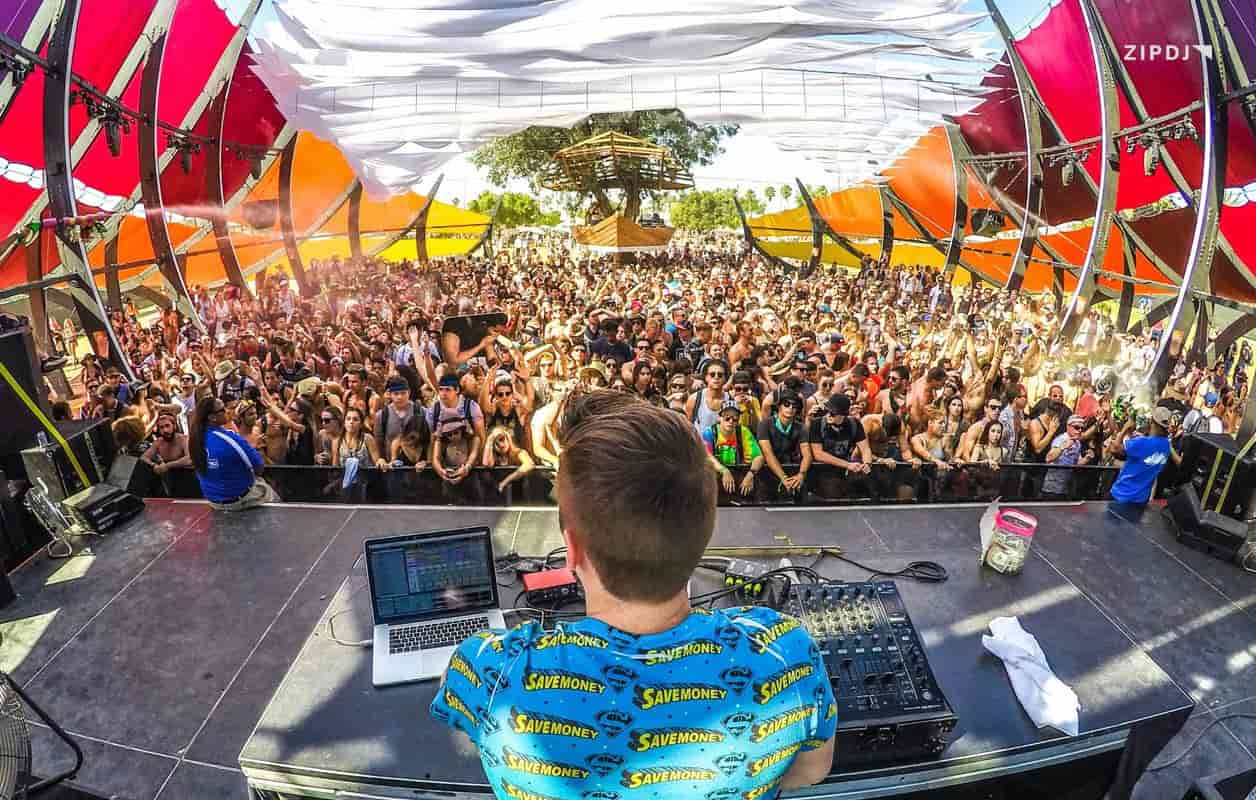How To Start A DJ Podcast In 2024 (Step-By-Step)

From discussing the latest releases to interviewing producers, there are many reasons why starting a DJ podcast is a great career choice.
DJ podcasts are becoming increasingly popular as the art form develops, and it doesn’t have to be expensive to get up and running.
Continue reading, and we’ll break down everything you need to know to launch a DJ podcast and create unique and compelling content.
How To Start A DJ Podcast In 2024 (Step-By-Step)
Choosing the best equipment, installing the relevant software, and lining up guests are just some of the things to consider when starting a podcast.
This guide breaks down these and other important steps you’ll need to consider to make sure your podcast stands out from the competition.
Now that you’re ready to start a DJ podcast in 2024, here’s everything you need to know:
Step 1: Research The Competition
Whatever the nature of a new business venture, competitor research should be the first important step you take before starting.
Before starting your own DJ podcast, you should spend time checking out the best DJ podcasts to see what works and what doesn’t.
This research will give you plenty of insights into the different podcast niches on offer, as well as how they are formatted.
Take notes when you listen to these podcasts and see how the best elements can be incorporated when you launch your DJ podcast.
For example, if it’s a podcast dedicated to discussions on new tracks, consider what factors come into play in these conversations.
You can also assess professional DJ podcasts for their overall sound quality and get a clearer idea of what equipment you may need.
For example, if it’s a podcast that uses video, investigate what camera gear they use and any software needed to keep the footage in sync.
Likewise, if the podcast features live DJ mixes, check out their DJ controllers and other equipment used for DJing to see what you’ll need.
Step 2: Decide Your DJ Niche
It can be tempting to launch a new podcast that covers a broad range of topics and musical styles that offer an open-ended approach.
But while this strategy gives you lots of leeway for content, you can run the risk of failing to stand out from the competition and offer something new.
To avoid this common pitfall of DJ podcasts, you should instead opt to cover a specific niche that most other podcasts aren’t already exploring.
If you’re a huge fan of the best old-school DJs, this could be a great topic for your own DJ podcast where you can share your expertise.
On the other hand, if you have industry contacts such as record label owners or artists, this will give you a much-needed edge.
These contacts will be able to help you access new tracks and create a quality DJ podcast that offers exclusive details to your audience.
Likewise, focusing on house or techno will allow you to gather a niche audience compared to taking a general approach to electronic music.
Ultimately, by selecting a unique niche that isn’t already covered elsewhere, your DJ podcast will have a much higher value in the DJing world.
Step 3: Choose Your Podcast Format
Once you’ve settled on a niche to explore in your podcast, it’s time to fine-tune the format so you understand what’s required.
Some DJ podcasts focus entirely on breaking down DJ mixes and discussing the art form, while others opt for in-depth interviews with guests.
DJ podcasts can also be formatted in a narrative form, taking a topic for each episode and breaking them down in detail for listeners.
For example, a podcast exploring the history of record players would feature a completely different format to one analyzing new releases.
The format will also play a large role in dictating what audio equipment you’ll need to run the podcast successfully without any technical hitches.
If you’re planning on hosting roundtable discussions, you’ll need the physical space and microphones for your guests to use in the conversation.
Such a format also requires extensive preparation, from scheduling your guests to performing sound checks across streaming platforms.
You’ll also need to research the terms and conditions of your streaming platform of choice, for instance, if you’re using iTunes or elsewhere.
This will help you avoid falling foul of any copyright law infringements or other rules that might cause your podcast to be removed.
Step 4: Invest In Audio Gear
If you’re considering setting up a podcast, the chances are you already have a good set of equipment you’re using to DJ with.
This equipment can provide you with a solid foundation from which to build up the relevant gear needed for hosting a podcast.
Some of the best DJ headphones are ideal for running a podcast, delivering consistently crisp and clear audio when interacting with guests.
Perhaps most important of all, you’ll need to pick up a microphone to use when speaking to your audience or interacting with guests.
There are many excellent mics on the market to choose from, and you’ll want one with USB connectivity with gain and compression settings.
Picking up a decent shock mount and pop filter is also important for ensuring consistent audio performance without distortion.
If you’re hosting guests on your podcasts, additional microphones will be required, as well as mic mounts for a comfortable user experience.
All headphones and microphones will need to be integrated through an audio interface and mixer to deliver quality and transparent audio.
If you’re also recording video for your podcasts, you’ll need cameras and can start by using your smartphone if your budget is tight.
Step 5: Install Audio Editing Software
Just as having the correct hardware is crucial for a successful podcast, so too should you invest in the relevant audio editing software.
There are several notable brands dedicated to developing audio editing software for podcasts, and it doesn’t have to break the bank/
Software such as the Logitech podcast editor is oriented toward delivering high-quality performance at an affordable price point.
You’ll need software that records 44.1 kHz audio at a bare minimum, with 48KhZ offering the best possible results for your audience.
If you’re planning on including video, avoid anything less than 720p and use video editing software that includes titles, transitions, and effects.
Podcast editing software such as Riverside and Audacity is set up to allow for multiple guests, with live monitoring also available.
If you have a background in DJ production, you can use this to integrate samples and other audio effects during your podcasts.
Additional editing tools for removing white noise and other audio distractions are also worth looking out for when choosing software.
Step 6: Plan Your Podcast Episodes
Once you’ve set up your podcast studio and decided on your format, it’s time to start planning in preparation for your first broadcast.
The nature of this preparation will vary depending on your chosen format but should be as thorough as possible to avoid unpleasant surprises.
If you’re covering the latest electronic music releases in the house and techno sphere, you’ll want to have tracks lined up and ready to play.
On the other hand, if you’re inviting on guests, you’ll need to schedule their appearance well in advance and notify them of the topic.
This includes being prepared in the event of a no-show, with a backup line-up of mixes and other content to use instead.
If you’re hosting your podcast on a weekly or monthly basis, work on preparing content for several episodes in advance.
Utilize any DJ time management tips you’ve picked up from gigging to help streamline your workflow and keep on top of your schedule.
Step 7: Contact Potential Guests
While playing new tracks from the music scene is a popular way to build an audience, exclusive guest interviews are a real draw.
These guests can offer invaluable insights into the DJing world and culture that other podcasts won’t be able to match.
This means reaching out to artists and other DJs who reflect your niche and inviting them to appear on your show as guests.
You can start by writing a list of your favorite DJs and seeing if they’re willing to come on your podcast and talk about their careers.
Make sure you have a plan of action beforehand, so they have a clear idea of what to expect as well as your knowledge of the industry.
Check out some of the best DJ blogs to get some inspiration on the hot topics that DJs are talking about you can use yourself.
If you’ve already had guests on your show, share links to these episodes when reaching out and showcase your experience.
Step 8: Reach Out To Record Labels
Just as reaching out to artists and producers is essential for getting on exciting guests, so too is contacting record labels vital for success.
Accessing exclusive music for your audience to listen to will help you stand out from the competition and bring real value to your fans.
Record labels are constantly on the lookout for new media outlets to increase their reach and drive sales to their target audience.
As such, you should position yourself as a tastemaker, highlighting any past events you’ve hosted to demonstrate your value.
The more successful podcasts you’ve uploaded, the greater your credibility will become, so reaching out to labels should be an ongoing process.
You can also utilize other avenues for contacting labels and artists who may be interested in collaborating with your DJ podcast.
For example, don’t overlook the importance of DJ pools for promotion, since these platforms have close relationships with record labels.
By fostering healthy relationships with industry professionals, your access to new music and potential for artist interviews will expand.
Step 9: Monetize Your Podcast
With podcasts increasing in popularity thanks to their accessibility and flexibility, they’re a great potential source of income.
There are a variety of methods you can employ to transform your DJ podcast into a consistent source of income over time.
One way to do this is to offer your fans a subscription service, granting them early access to new episodes and exclusive content.
You can also use your podcast to host adverts and sponsorships, selling products or services that your audience is interested in.
Automated ads can be set up in a short period, offering a scalable revenue stream that increases in line with your reach.
If you’re a music producer, you can use your platform to share links to your digital audio files, physical media, and other merchandise.
Monetization can also include selling DJ tutorials for beginners to offering deals on sample packs to use when scratching.
As your podcast grows, you can use data analytics tools to see what monetization strategy delivers the best return for the least amount of work.
Step 10: Share Your Podcast Online
Once you’ve recorded your DJ podcast, it’s time to upload it online to your platform of choice and gather feedback from listeners.
There are several popular online platforms where podcasts are hosted, and you don’t have to limit yourself to just one.
Spotify, iTunes, and YouTube all have established audiences thirsting for new and exciting content on a broad range of subjects.
Before you decide on which podcast directories you want to use, you should research to see what other content they have in your domain.
You should also consider how widespread each platform is and whether or not it has the kind of reach needed to hit your audience.
It’s important to appreciate how fluid the future of music is and be able to adapt to industry changes and new emerging technologies.
This includes having a grasp of how data-driven streaming services are on the rise, and how you can marshal this data to your advantage.
Once your podcasts are online, make sure you check user comments and other feedback so you can tailor your future content.
Summary
Setting up a DJ podcast is a popular way for aspiring and established DJs to grow their audience and gain insights into the industry.
This guide has covered the core steps you’ll need to take to start your own DJ podcast with the relevant equipment, software, and mindset.
The more followers you pick up as your podcast grows, the stronger your chances are of attracting high-profile guests to talk on your show.
Connect with professionals with a ZIPDJ subscription and access exclusive music to create the best DJ podcast.
Not a member ?
Join Today for Unlimited Music Downloads. Visit zipdj.com for more information.



